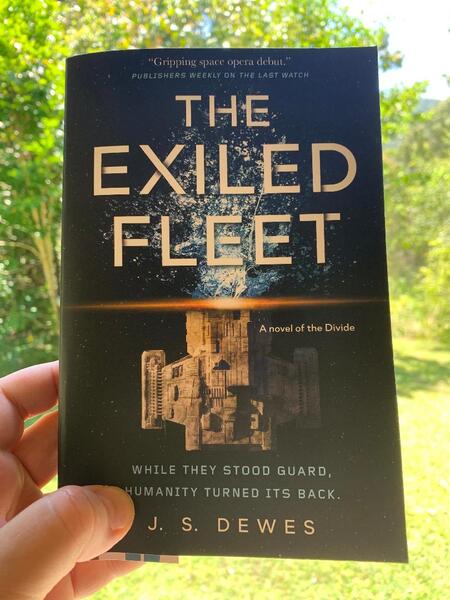
Finding intimate character moments in the midst of a sprawling space opera may seem like a strange anomaly, but the truth is that the two go together in ways many people not familiar with genre may not fully expect.
Much like movie blockbusters which neatly characters with real, fully-rounded humanity to feel substantial and impactful, space operas rise and fall on their emotional resonance and this largely comes down to how much we care about the characters who drive the sprawlingly intense stories forward.
Take out those characters and you have an empty, hollow shell of a behemoth, impressive in its action and its galaxy-spanning impact but lacking any kind of heart and soul and thus, any real reason for you to care about what happens next.
That’s not even remotely an issue in the second book in The Divide Series by J. S. Dewes, The Exiled Fleet, which wraps an empire-sized struggle against sclerotic, cruel authoritarianism around a number of key characters who make the beautifully-written pages come emotively alive in ways that are truly affecting and narratively enriching.
The Exiled Fleet follows the events of The Last Watch, in which some 8000 Sentinel military personnel charged by the human-based System Collective with keeping watch over the Divide which marks the demarcation point between the galaxy and the inky nothingness of wider space found themselves in danger of being sucked into oblivion as the barrier began to contract in horrifyingly swift fashion.
She’d been gone almost six months, and the more outwardly worried Jackin grew, the more genuinely concerning it became.
It’d been a long time since Cavalon had missed someone, and even longer since he truly worried whether someone was alive. It was times like this he wished there were some worthy deities to pray to for her safe return. or to blame if she never came back.
Already cut adrift by the central government which is ruled by the tyrannically pragmatic Emperor Augustus who presides over a corrupt ruling system of corporations and entitled royal houses – thousands of years after humanity fled Earth, we have reverted to feudal monarchies; hurrah for the future! – the Sentinels faced being wiped from the face of the galaxy until Adequin Rake, an ex-elite soldier known as a Titan and newly-minted commander of the Argus, sets out to rescue as many of her fellow ostracised Sentinels as she can.
It’s a desperate race against time that involves a risky strategy best left to the reading – quite why the Divide is collapsing is brilliantly clever and proof that Dewes is a gifted writer with the powerfully thoughtful imagination – and as The Exiled Fleet opens, Rake and her inner circle as Cavalon, dissident heir to the empire and talented astro-mechanic, second-in-command Jackin who’s gruff but with a heart of gold and Savant Mesa, to name just three, are grappling with the great losses imposed upon them.
In short order, they have lost their reason to be, many of their fellow military personnel and the support of a central government which is determined to replace its human soldiers with alien-sourced clones known as Drudgers, with all of them left to die on the rapidly-shrinking edge of the galaxy.
The key thing is that they have survived, but with no engines on their ships – engines means propulsion and forward momentum and Augustus and his military elite don’t watch this collection of criminals and political prisoners to be able to go anywhere – they face starvation and being wiped out if the Divide decides to keep marching towards the centre of the System Collective.
With world-building of the grandest, most enthrallingly expansive order, and characterisation so richly detailed and and emotionally alive, The Exiled Fleet takes what is by any stretch of the imagination a massively big premise and runs with it, giving us a heady mix of raw on-the-brink humanity and a story where the fate of the entire galaxy, and all the life that exists within it, human and alien, including the Viator who almost drove human civilisation to extinction, is very much on the edge.
End of the world threats are very much the lifeblood of sci-fi and fantasy but here Dewes takes a well-used trope and give it new vitality as she asks us to consider what a looming apocalypse means to people who have already lost everything, or almost everything, and who could simply throw in the towel and do their best to save themselves and screw everyone else.
Cast aside by a society which saw no further use for them, not once but twice, the second arguably the most cataclysmic although the first was a repudiation of their basic rights as people and thus damaging in its own right, you could well understand if they did just walk away, well, figuratively at least, but they don’t, doing their best to save themselves through excitingly ambitious means so they can save the System Collective from its dictatorial worst.
For the first time, she wonders if it’s aggregate. If the futures they see at the Divide aren’t time-fractured ripples of their own possibilities, but instead glimpses of entire other universes. If it’s not just the balance of their own mass against their own dark energy, but if by stopping their own collapse, they’ve put infinite other cosmos and infinite other lives at risk.
She [Adequin] knows one unequivocal truth. The Divide will find a balance, one way or the other. It will get its pound of flesh. It will pit species against species and universe against universe until nothing but stardust remains.
It’s this innate morality and ethical humanity that makes The Exiled Fleet such a compelling read.
Sure, there is explosively good action where the Sentinals, led by Rake who is strong and vulnerable in equal measure, and it’s is beguilingly good to read as they race to secure fuel, food and a means of getting away from the crumbling edge of the galaxy which is being held in place by alien tech that’s seen better days, but what really brings the story is alive is how all this action, this unceasing need to both survive and strike back at those who have wronged them while selflessly saving others, is informed by whom Rake, Cavalon, Jackin, Owen and a host of others are.
What drives ostracised people, all carrying hurt and grievance, loss and pain, to push through their broken humanity, their past scars and abiding sadness at the state of their lives past and present, to look past all that, even as they acknowledge its existence (they have to; there’s no escaping it) and give up a future away from it all to save humanity from itself?
It’s a compelling idea and one Dewes explores in vivaciously rich and moving detail, seamlessly bringing together pedal-to-the-metal action with moments so raw and tender that you wonder how the two can possibly exist together.
But they do, and the fact that they do and that they come together in such a fantastically good and affecting story such as The Exiled Fleet is testament to the author’s ability to be both boldly big and intimately small and to never forget that the story of humanity, even far in the future where spaceships and planet-sized generators are the stuff of everyday, is made of small, broken, beautiful moments that define who we are, what we are prepared to do and what the future, as a result, will look like.
